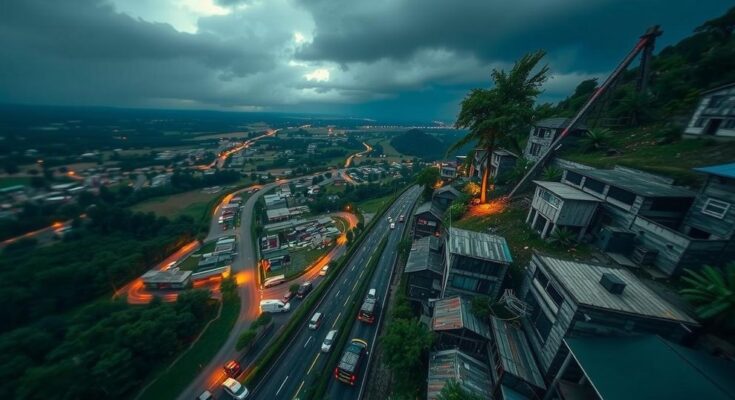Eastern DRC is experiencing a chronic cycle of violence, with attacks by groups such as the ADF resulting in significant civilian casualties and displacement. The international community’s response has been characterized by outdated peace-building efforts and inconsistent strategies, leading to a lack of effective intervention. New non-Western influences are emerging in the region, complicating the already precarious geopolitical landscape and highlighting a critical need for reassessment of conflict resolution approaches.
The eastern Democratic Republic of the Congo (DRC) is suffering from a persistent cycle of violence, displacement, and international neglect. Recent attacks, including a massacre on August 10 that resulted in 18 deaths near Beni, are indicative of ongoing instability. The Allied Democratic Forces (ADF), a rebel group with connections to the Islamic State, is often cited as the primary actor contributing to the violence, yet military forces—including the Congolese army, Ugandan military, and UN peacekeepers—have frequently stood by without intervening. This trend of inaction can be viewed as part of a broader pattern of failure by the international community to effectively engage with the complex political and conflict dynamics in the region. For nearly three decades, the DRC has remained at the epicenter of conflict-induced displacement, with almost 7 million individuals currently internally displaced, according to the International Organization for Migration. The international response, characterized by outdated peace-building efforts and a lack of profound political understanding, has fallen short of addressing the underlying issues driving violence. While the renewed activity of the March 23 Movement (M23) has drawn some international attention to the DRC, this focus has overshadowed numerous other armed groups contributing to the strife and instability. The government’s reliance on nationalist rhetoric to muster support for military action against M23 has inadvertently emboldened various militias, complicating the already precarious security situation. International funding aimed at conflict resolution continues to flow into the region, yet much of this investment is based on simplistic perspectives of the conflicts. Critics argue that Western responses remain technocratic and superficial, lacking strong commitments to effective measures that address corruption and promote genuine social cohesion. Moreover, the international stance toward neighbor states involved in DRC’s conflicts tends to be inconsistent. Despite condemning Rwandan support for M23, for instance, Western powers simultaneously extend military assistance to Rwanda for unrelated regional conflicts, highlighting a strategic disconnect. As the DRC struggles, alternative forms of influence have begun to surface, challenging the Western-led dynamics of the past. Non-Western actors, including those without commitments to humanitarian principles, are seeking to expand their foothold in the DRC in the context of evolving geopolitical complexities. The response strategies employed are emblematic of a failed paradigm of conflict resolution. The West’s waning influence in the DRC aligns with a disturbing trend of Congolese elites outsourcing security to armed groups and private military firms, reflecting a fragmented approach to governance and the privatization of security. The repercussions of these developments are dire, perpetuating a cycle of instability that exacerbates civilian suffering and complicates the prospects for peace in the region.
The Democratic Republic of the Congo (DRC) has faced chronic conflict and instability over the past three decades, particularly in the eastern regions bordering Uganda. This situation has led to displacements fueling humanitarian crises and widespread human rights violations. The presence of multiple armed groups, including the ADF and M23, has contributed to a complex security environment. Historically, international responses have consisted of peacekeeping efforts and humanitarian aid; however, these strategies have proven inadequate in curbing violence and fostering sustainable peace in a region plagued by competing interests and external influences.
In conclusion, the situation in eastern DRC underscores a profound failure of the international community to adapt to the region’s dynamic conflict landscape. Despite significant investments in peace-building and humanitarian efforts, the lack of a nuanced understanding of political realities and the complexities of local power dynamics have resulted in ineffective and often counterproductive responses. As new geopolitical actors emerge, the need for a comprehensive reevaluation of strategies aimed at conflict resolution and humanitarian engagement becomes increasingly critical to alleviate civilian suffering and restore stability in the DRC.
Original Source: www.aljazeera.com




